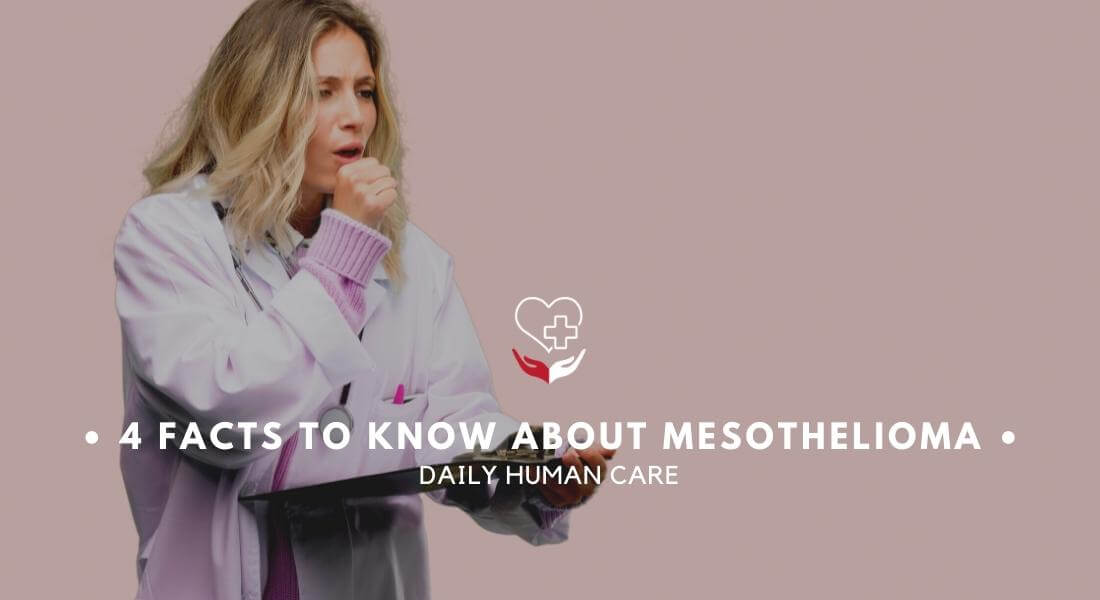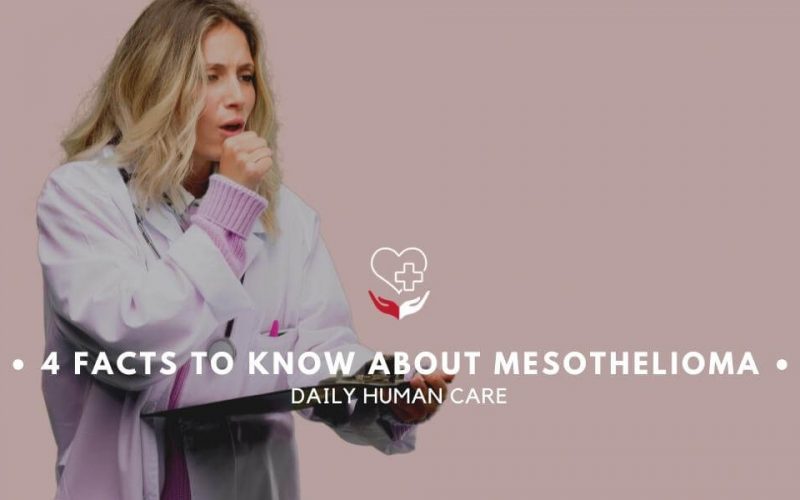Table of Contents
Facts about mesothelioma
Mesothelioma is a cancer that affects a tissue called the Mesothelium. This tissue works as a protective membrane covering the lungs, abdomen, heart, and testes. According to The Mesothelioma Center’s statistics, males are more susceptible to Mesothelioma.
Understanding some key points can help you make certain decisions about your health if you or anyone you know has been diagnosed with Mesothelioma. This could also raise awareness of the disease since the exposure can affect all of us. Here are five facts to know about Mesothelioma.

Exposure to Asbestos
Around 80% of Mesothelioma cases reported are said to have come from exposure to Asbestos. This can come either through inhaling it or unintentionally swallowing it. After your body has been exposed to asbestos, it’s common for Mesothelioma to start forming instantly, with no prevailing signs until 5-10 years after the exposure.
The people most at risk of being exposed to asbestos are construction workers, firefighters, industrial workers, power plant workers, and shipyard workers. Another line of work where there is a high chance of being exposed to asbestos is workers who work in demolishing old buildings and houses, as asbestos can be found in walls, ceilings, floors, and roofs.
If your work environment has high asbestos exposure, you should contact your doctor immediately for early detection and diagnosis.
Mesothelioma Types
On the topic of Types of Mesothelioma, the spread of this cancerous growth depends majorly on the affected area.
Pleural Mesothelioma, which accounts for 70 -75% of the cases, makes it the most common type of Mesothelioma. This occurs in the pleura, a surrounding tissue that protects the lungs. Symptoms include shortness of breath, chest pains, unintended weight loss, and constant fever and fatigue.
Peritoneal Mesothelioma spreads from the tissue surrounding your abdominal organs. Symptoms include abdominal pain and swelling, loss of appetite, bloating, and bowel changes.
Pericardial mesothelioma develops in the pericardium (protective heart sac). This form of Mesothelioma is pretty uncommon as only around 200 cases have been reported. Symptoms include irregular heartbeats, chest pains, and difficulty in breathing. The life expectancy is not very promising for anyone who has developed this form of Mesothelioma.
Testicular Mesothelioma, which develops in the outer lining of the testes and is the rarest form of Mesothelioma, makes up only 1% of all cases that have been reported. Because of its rarity, no common symptoms are known; however, you might notice some scrotal swelling and testicular lumps that do not hurt.
Treatment of Mesothelioma
The treatment for mesothelioma depends on the type that you have. Benign mesothelioma is noncancerous and will not spread to other parts of your body. It can be surgically removed, and you have a chance of making a full recovery if they have been removed completely, with no chance of it coming back.
Malignant Mesothelioma requires much more care and treatment as it is cancerous and can spread through your body. Depending on how much cancer has progressed, your doctor will decide the course of action to remove the tumor. This is usually done through surgery, with or without chemotherapy and radiation. Even though this may be the best treatment, there are still complications that can come up, such as infections, heart attacks, or kidney failure.
Alternatively, benign mesothelioma is noncancerous – hence, it is not fatal. However, there’s a great chance of it becoming malignant if left untreated. Diagnosis is critical as mesothelioma can go undetected at its early stages as the patient may not show any visible symptoms. While surgery and chemotherapy may be able to help you recover, it isn’t the most successful treatment for it. But, if the tumor is detected early and is treated immediately, it increases your chance of making a full recovery.
Nutrition
A whole variety of nutritional foods available are safe for mesothelioma patients. If you suffer from malignant mesothelioma, your immune system will significantly weaken, leading to multiple health conditions. Having a well-balanced diet is crucial to keep your energy levels up as you go through your recovery stages.
As a mesothelioma patient, you might want to abstain from certain foods like red and processed meats, trans fats, and alcohol. Instead, go for food options like healthy protein and fats, vegetables like kale, collard greens, sweet potatoes, etc., and loads of berries and fresh fruits, which are a great source of antioxidants. Dietary supplements are also an alternative if you have any problems or allergies to the foods required while suffering from mesothelioma.
It is also a healthy habit to practice food safety. Since malignant mesothelioma will weaken your immune system, you would want to avoid any unnecessary illnesses from the foods you eat. Doing things like thoroughly washing your food with water before cooking, always using clean utensils, and cooking your food at the right temperatures can go a long way toward ensuring the food will be safe for you to consume
A well-balanced diet is necessary before, during, and after recovery to strengthen your chances of fighting this disease. A doctor or a dietician can help you figure out which foods will be best for you to have, keeping in mind all your allergies and accessibility to all these items.
Conclusion
The best preventive measure against mesothelioma is yearly scanning and doctor’s appointments for early detection. While efforts have been made to minimize the risk of asbestos exposure over the years, it is still found in many office buildings, roads, and houses. Unfortunately, these things are not in our control, but the best way is to take precautions.
Suppose you have been prone to asbestos exposure and have recently noticed symptoms like experiencing breathing problems. In that case, it’s best to speak to your physician immediately to tackle the disease within its benign phase. Additionally, consider speaking to your friends and family and getting their support as the treatment takes time. Gather as much information as possible from your healthcare workers and everyone involved.
Educating ourselves about the disease is one of the best things we can do to make things easier and have a clearer picture of what to expect.
DISCLAIMER: This is a sponsored post. Daily Human Care does not endorse and is not responsible or liable for any information, accuracy, quality, advertising, drugs, doctors, goods, or other items on this page because it is a sponsored press release. Before taking any steps, readers should conduct their own research. Daily Human Care (DHC) is not liable for any damage or loss caused or alleged to be caused by or in connection with the use of or reliance on any of the content, goods, or services mentioned in this article, whether directly or indirectly.





